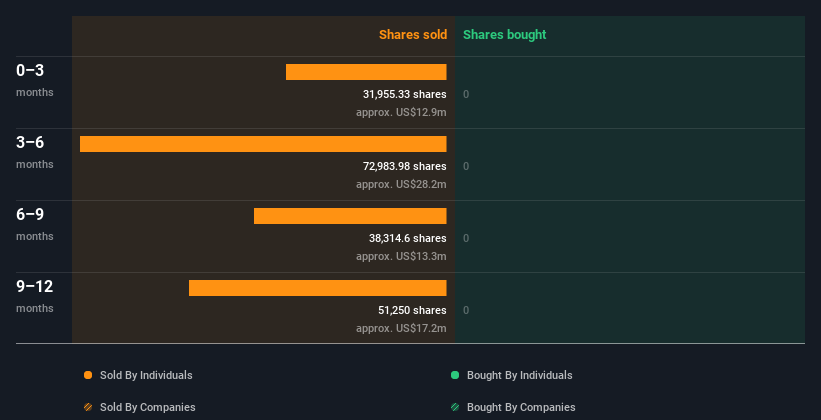- United States
- /
- Software
- /
- NasdaqGS:MSFT
Possible Bearish Signals With Microsoft Insiders Disposing Stock
In the last year, many Microsoft Corporation (NASDAQ:MSFT) insiders sold a substantial stake in the company which may have sparked shareholders' attention. Knowing whether insiders are buying is usually more helpful when evaluating insider transactions, as insider selling can have various explanations. However, when multiple insiders sell stock over a specific duration, shareholders should take notice as that could possibly be a red flag.
While we would never suggest that investors should base their decisions solely on what the directors of a company have been doing, we would consider it foolish to ignore insider transactions altogether.
See our latest analysis for Microsoft
Microsoft Insider Transactions Over The Last Year
Over the last year, we can see that the biggest insider sale was by the President & Vice Chairman, Bradford Smith, for US$20m worth of shares, at about US$412 per share. So it's clear an insider wanted to take some cash off the table, even below the current price of US$431. As a general rule we consider it to be discouraging when insiders are selling below the current price, because it suggests they were happy with a lower valuation. While insider selling is not a positive sign, we can't be sure if it does mean insiders think the shares are fully valued, so it's only a weak sign. This single sale was just 8.7% of Bradford Smith's stake.
In the last year Microsoft insiders didn't buy any company stock. The chart below shows insider transactions (by companies and individuals) over the last year. By clicking on the graph below, you can see the precise details of each insider transaction!

For those who like to find hidden gems this free list of small cap companies with recent insider purchasing, could be just the ticket.
Insiders At Microsoft Have Sold Stock Recently
Over the last three months, we've seen significant insider selling at Microsoft. In total, insiders dumped US$13m worth of shares in that time, and we didn't record any purchases whatsoever. Overall this makes us a bit cautious, but it's not the be all and end all.
Insider Ownership
Looking at the total insider shareholdings in a company can help to inform your view of whether they are well aligned with common shareholders. We usually like to see fairly high levels of insider ownership. Microsoft insiders own about US$1.1b worth of shares (which is 0.03% of the company). This kind of significant ownership by insiders does generally increase the chance that the company is run in the interest of all shareholders.
So What Do The Microsoft Insider Transactions Indicate?
Insiders haven't bought Microsoft stock in the last three months, but there was some selling. Looking to the last twelve months, our data doesn't show any insider buying. But it is good to see that Microsoft is growing earnings. It is good to see high insider ownership, but the insider selling leaves us cautious. In addition to knowing about insider transactions going on, it's beneficial to identify the risks facing Microsoft. To assist with this, we've discovered 1 warning sign that you should run your eye over to get a better picture of Microsoft.
If you would prefer to check out another company -- one with potentially superior financials -- then do not miss this free list of interesting companies, that have HIGH return on equity and low debt.
For the purposes of this article, insiders are those individuals who report their transactions to the relevant regulatory body. We currently account for open market transactions and private dispositions of direct interests only, but not derivative transactions or indirect interests.
New: Manage All Your Stock Portfolios in One Place
We've created the ultimate portfolio companion for stock investors, and it's free.
• Connect an unlimited number of Portfolios and see your total in one currency
• Be alerted to new Warning Signs or Risks via email or mobile
• Track the Fair Value of your stocks
Have feedback on this article? Concerned about the content? Get in touch with us directly. Alternatively, email editorial-team (at) simplywallst.com.
This article by Simply Wall St is general in nature. We provide commentary based on historical data and analyst forecasts only using an unbiased methodology and our articles are not intended to be financial advice. It does not constitute a recommendation to buy or sell any stock, and does not take account of your objectives, or your financial situation. We aim to bring you long-term focused analysis driven by fundamental data. Note that our analysis may not factor in the latest price-sensitive company announcements or qualitative material. Simply Wall St has no position in any stocks mentioned.
About NasdaqGS:MSFT
Microsoft
Develops and supports software, services, devices, and solutions worldwide.
Flawless balance sheet with solid track record and pays a dividend.
Similar Companies
Market Insights
Weekly Picks


Ferrari's Intrinsic and Historical Valuation


Investment Thesis: Costco Wholesale (COST)

Undervalued Key Player in Magnets/Rare Earth
Recently Updated Narratives

Salesforce's Market Dominance and AI Pivot Will Drive Earnings Re-acceleration


IREN's Trump Card: How Federal Policy Could Unlock Massive Value in AI Infrastructure


ESPN’s NFL Power Play: How Disney’s Sports Engine Could Drive the Next Leg of Stock Growth
Popular Narratives


The "Sleeping Giant" Stumbles, Then Wakes Up


NVDA: Expanding AI Demand Will Drive Major Data Center Investments Through 2026

Undervalued Key Player in Magnets/Rare Earth
Trending Discussion


I'm exiting the positions at great return! WRLG got great competent management. But, 100k oz gold too small in today environment. They might looking for M/A opportunity in the future, or they might get take over by Aris Mining, I don't know. But, Frank Giustra stated he's believed in multi-assets, so that's my speculation. Anyhow, I want to be aggressive in today's gold price. I'm buying Lahontan Gold LG with this as exchange. Higher upside, more leverage. WRLG CEO is BOD's of LG, that's something. This will be my last update on WRLG, good luck!





